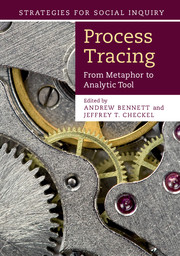Book contents
- Frontmatter
- Contents
- List of figures
- List of tables
- List of contributors
- Preface
- Part I Introduction
- Part II Process tracing in action
- 2 Process tracing the effects of ideas
- 3 Mechanisms, process, and the study of international institutions
- 4 Efficient process tracing
- 5 What makes process tracing good?
- 6 Explaining the Cold War’s end
- 7 Process tracing, causal inference, and civil war
- Part III Extensions, controversies, and conclusions
- Appendix Disciplining our conjectures
- References
- Index
7 - Process tracing, causal inference, and civil war
Published online by Cambridge University Press: 05 November 2014
- Frontmatter
- Contents
- List of figures
- List of tables
- List of contributors
- Preface
- Part I Introduction
- Part II Process tracing in action
- 2 Process tracing the effects of ideas
- 3 Mechanisms, process, and the study of international institutions
- 4 Efficient process tracing
- 5 What makes process tracing good?
- 6 Explaining the Cold War’s end
- 7 Process tracing, causal inference, and civil war
- Part III Extensions, controversies, and conclusions
- Appendix Disciplining our conjectures
- References
- Index
Summary
Introduction
Process tracing is an invaluable tool in the civil war scholar’s toolkit. Or, rather, it should be, for it provides the ability to move beyond statistical association toward causal inference about why (and how) outcomes are produced in civil war settings. Yet, scholars have too often neglected its use. Instead, great pains have been taken to construct research designs that (at best) are able to identify suggestive correlations between variables, but lack the ability to test the mechanism(s) at work. Qualitative research is not immune to this criticism, either, for process tracing, when properly conducted, establishes a standard for rigor that often goes unmet even in detailed historical cases (see also Evangelista, this volume, Chapter 6). This is an unfortunate state of affairs; without understanding the causal processes that underpin associations, we foreclose opportunities to advance our theories of civil war and contribute to debates about the efficacy of different policies in violent settings.
This chapter emphasizes the practicalities of marrying design-based inference with the strengths of process tracing to improve our ability to build and (especially) test theories about civil war onset and dynamics. Bennett and Checkel’s ten best practices for process tracing (this volume, pp. 20–31) provide a springboard for a discussion of how to identify and conduct rigorous process tracing in settings marked by poor (or no) data, security concerns, and fluid events. The chapter also introduces ideas from the now-burgeoning literature on causal inference to help guide decisions about case selection and evidentiary standards. In particular, the approach advocated here draws on a potential outcomes framework that hinges on the use of counterfactual observations, “elaborate” theory, and qualitative evidence on treatment assignment to facilitate drawing causal inferences about why wars break out and how they are fought (see also Dunning, this volume, Chapter 8, on using process tracing to assess assignment to treatment).
- Type
- Chapter
- Information
- Process TracingFrom Metaphor to Analytic Tool, pp. 186 - 208Publisher: Cambridge University PressPrint publication year: 2014
- 16
- Cited by



